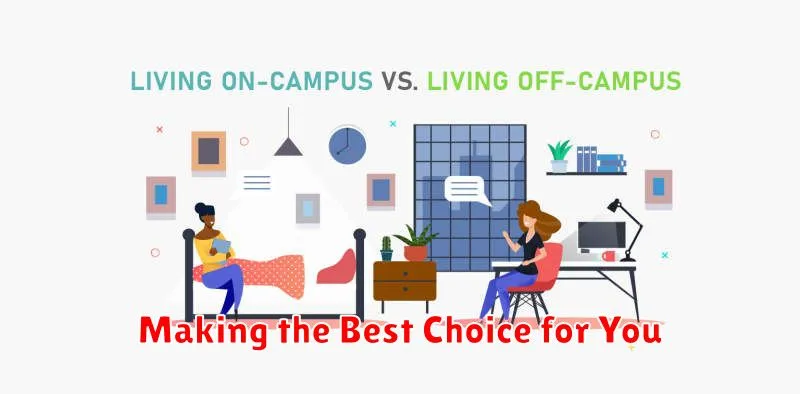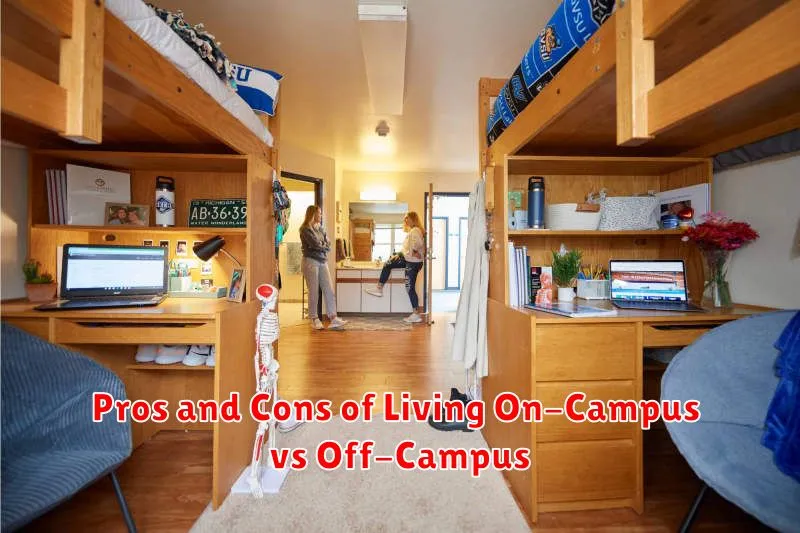Choosing between on-campus and off-campus living is a major decision for college students. This decision significantly impacts your college experience, affecting everything from your finances and social life to your academic performance. Understanding the pros and cons of each option is crucial for making the best choice for your individual needs and preferences. This article will explore the advantages and disadvantages of on-campus living versus off-campus living, providing a comprehensive guide to help you navigate this important decision.
Weighing the pros and cons of on-campus vs. off-campus housing requires careful consideration of various factors. Cost, convenience, community, and commute are just a few of the key elements to consider. We will delve into these factors, examining the benefits and drawbacks of both on-campus living and off-campus living to help you determine which housing option best aligns with your lifestyle, budget, and overall college goals.
Convenience and Proximity to Classes
A primary advantage of on-campus living is the unparalleled convenience and proximity to classes. Students can often reach their lectures within minutes, eliminating lengthy commutes and the associated costs and stresses, such as traffic or unreliable public transport. This extra time can be dedicated to studying, extracurricular activities, or simply relaxing.
Living on-campus fosters a greater sense of community as well. The close proximity to academic buildings encourages more frequent interaction with faculty and peers, creating more opportunities for collaboration and academic support.
Cost Comparison
A crucial factor in deciding between on-campus and off-campus living is the overall cost. On-campus housing often includes utilities, internet, and sometimes meal plans in a single bill, simplifying budgeting. However, these bundled costs can be higher than off-campus options, particularly in areas with lower average rents.
Off-campus housing presents more variability in cost. Rent can be lower, especially when sharing with roommates. However, renters are responsible for utilities, internet, groceries, and other household expenses, which can add up. A comprehensive budget is essential to accurately compare off-campus costs to on-campus bundled pricing.
Social Opportunities On-Campus

Living on-campus provides unparalleled access to a vibrant social scene. Proximity to other students fosters a sense of community and facilitates spontaneous interactions.
Residence halls often organize social events, creating opportunities to meet new people and build friendships. Shared common areas, such as lounges and study rooms, also encourage interaction. Furthermore, easy access to campus clubs and organizations makes it simpler to find like-minded individuals and pursue shared interests.
Independence Off-Campus
A primary advantage of off-campus living is the increased independence it offers. Students are responsible for managing their own household, from paying bills and grocery shopping to cooking and cleaning. This fosters valuable life skills and a sense of self-reliance, preparing them for life after graduation.
Off-campus housing also allows for greater freedom in choosing living arrangements and roommates. Students can find accommodations that better suit their individual needs and preferences, whether it’s a quiet apartment for focused studying or a shared house with close friends for a more social environment.
Campus Resource Accessibility
A key distinction between on-campus and off-campus living is the accessibility of campus resources. Living on campus provides immediate proximity to libraries, computer labs, academic advising, and health services. This convenience can significantly impact academic performance and overall well-being.
For students living off-campus, accessing these resources requires commute time and may be limited by transportation availability and operating hours. While off-campus living may offer other advantages, the ease of access to essential campus resources is a significant benefit of on-campus housing.
Privacy and Personal Space
On-campus living typically offers less privacy. Sharing a room, bathroom, or common areas with roommates can be a significant adjustment. Quiet study time can be challenging to find, and personal belongings might not always be entirely secure.
Off-campus housing options generally provide more privacy and personal space. Students can have their own rooms, bathrooms, and kitchens, offering greater control over their environment. This can be conducive to focused studying and a stronger sense of personal security.
Transportation Considerations
A key factor in the on-campus vs. off-campus decision is transportation. Living on campus often eliminates the need for a personal vehicle. Most necessities are within walking distance, and many campuses offer robust public transit systems. This can translate to significant cost savings, eliminating car payments, insurance, gas, and maintenance.
Conversely, living off-campus may require a car, depending on the location and availability of public transportation. While offering greater flexibility to explore the surrounding area, this comes with the added expenses of vehicle ownership and operation. Factoring in commute times to campus is also essential.
Meal and Dining Options
A key difference between on-campus and off-campus living lies in meal options. On-campus housing often includes meal plans, offering convenience and a structured approach to dining. These plans typically provide access to dining halls with a variety of options.
Off-campus living necessitates independent meal preparation. This offers greater control over diet and budget, but requires time and effort for grocery shopping and cooking. Students must factor these considerations into their decision-making process.
Safety and Security Factors
Safety and security are paramount considerations when choosing between on-campus and off-campus housing. On-campus housing generally offers a higher level of security with features like controlled access, resident advisors, and campus security patrols. This creates a more structured and monitored environment.
Off-campus housing options vary significantly in terms of safety. Students need to carefully evaluate factors such as neighborhood crime rates, building security measures, and the presence of security systems. Individual responsibility for safety is significantly greater when living off-campus.
Making the Best Choice for You

Ultimately, the “best” choice between on-campus and off-campus living depends on your individual needs and priorities.
Consider your budget. On-campus housing often bundles costs, while off-campus living requires managing separate bills. Think about your desired level of independence and social interaction. On-campus living can foster a strong sense of community, while off-campus offers greater autonomy.
Reflect on your commuting preferences. Living on-campus eliminates the commute, whereas off-campus necessitates transportation. Finally, evaluate your lifestyle and desired living arrangements, such as preferred amenities and roommate situations.

